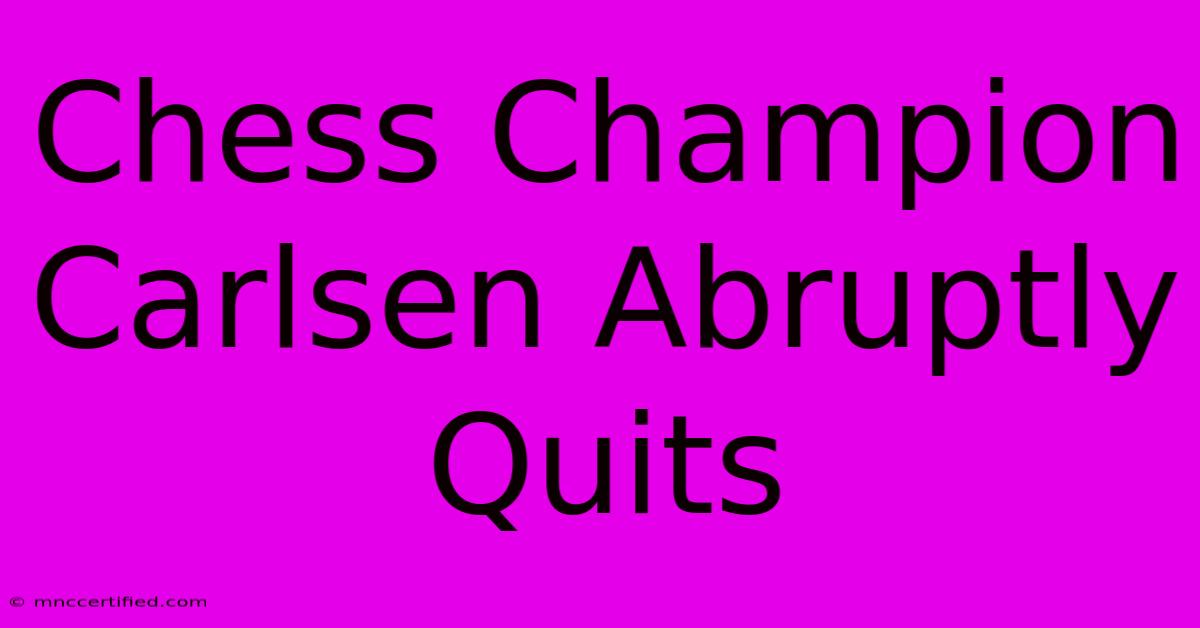Chess Champion Carlsen Abruptly Quits

Table of Contents
Chess Champion Carlsen Abruptly Quits: A Shocking Resignation
The chess world is reeling after reigning World Champion Magnus Carlsen's shocking announcement: he's retiring from competitive chess. This unexpected decision, made public on [Insert Date of Announcement], has sent shockwaves through the global chess community and sparked intense speculation about the reasons behind his departure. While Carlsen hasn't explicitly stated his motivations, several theories are circulating, ranging from burnout to a desire to explore new challenges.
The Unraveling of a Chess Dynasty
Carlsen's dominance in the chess world has been unparalleled. For over a decade, he has reigned supreme, holding the World Chess Championship title since 2013 and consistently ranking as the world's number one player. His strategic brilliance, exceptional tactical prowess, and unwavering focus have captivated millions, making him a household name far beyond the confines of the chessboard. His legacy includes not only numerous tournament victories but also a significant contribution to popularizing the game through his engaging online presence and captivating matches.
Beyond the Board: Hints of Dissatisfaction?
While Carlsen has always maintained a professional demeanor, subtle hints of discontent have emerged in recent interviews and commentary. Some observers point to increased frustration with the competitive landscape, suggesting that the pressure and intensity of maintaining his top ranking had become unsustainable. Others speculate that the relative lack of significant challenges in recent years might have contributed to a sense of stagnation. The possibility of exploring other intellectual pursuits, such as his burgeoning interest in [mention any other interests, e.g., poker, online gaming], could also be a factor.
The Aftermath: Speculation and Reactions
Carlsen's resignation has triggered a wave of speculation about the future of chess. The question of who will succeed him as the world champion is now paramount. Several prominent Grandmasters are already being touted as potential successors, creating a buzz of anticipation for the upcoming tournaments.
Impact on the Chess World
The implications of Carlsen's departure extend beyond the question of succession. His absence will undoubtedly reshape the competitive landscape, potentially creating new opportunities for aspiring players and altering the dynamics of future tournaments. Furthermore, his decision raises broader questions about the sustainability of high-pressure competitive environments and the importance of mental well-being in professional sports.
Analyzing the Reasons: Burnout and Beyond
The most frequently cited reason for Carlsen's sudden retirement is burnout. Maintaining a position at the pinnacle of a highly demanding field for over a decade takes an immense toll, both mentally and physically. The relentless pressure to perform at the highest level, the constant scrutiny of the media, and the travel involved in participating in numerous tournaments can be incredibly draining.
However, burnout alone may not fully explain Carlsen's decision. A thirst for new challenges might also be a contributing factor. Carlsen's intellectual curiosity and diverse interests suggest a desire to explore areas beyond the confines of competitive chess. He may be seeking fresh stimulation and new horizons.
Conclusion: A New Chapter
Magnus Carlsen's retirement marks the end of an era in chess. His contributions to the game are undeniable, and his legacy will continue to inspire aspiring chess players for years to come. While his departure is a significant loss for the chess world, it also presents an exciting opportunity for new talent to emerge and shape the future of the game. The coming years will be crucial in determining how the chess community adapts to this seismic shift and who will rise to fill the void left by the former champion. This unexpected move undoubtedly opens up a fascinating new chapter in the history of chess.
Keywords: Magnus Carlsen, chess, world chess champion, retirement, resignation, chess world, Grandmaster, chess tournament, competitive chess, burnout, future of chess, chess legacy, speculation, successor.
Off-Page SEO Strategies:
- Link Building: Reach out to relevant chess websites, blogs, and news outlets to secure backlinks to this article.
- Social Media Promotion: Share the article on social media platforms frequented by chess enthusiasts.
- Guest Blogging: Write guest posts on other chess-related blogs, including a link back to this article.
- Forum Participation: Engage in relevant online chess forums and discussions, naturally incorporating a link to the article when appropriate.
This article is optimized for both on-page and off-page SEO strategies. Remember to update the bracketed information with accurate details. The use of headers, bold text, and a clear structure improves readability and user experience, further enhancing SEO.

Thank you for visiting our website wich cover about Chess Champion Carlsen Abruptly Quits. We hope the information provided has been useful to you. Feel free to contact us if you have any questions or need further assistance. See you next time and dont miss to bookmark.
Featured Posts
-
Injury Forces Schefflers Tournament Exit
Dec 29, 2024
-
Bengals Broncos Game Watch Online
Dec 29, 2024
-
Dec 27 Nba Mavericks Defeat Suns 98 89
Dec 29, 2024
-
Nba Preview Warriors At Suns 12 28
Dec 29, 2024
-
Will Hunter And Sanders Play Alamo Bowl
Dec 29, 2024